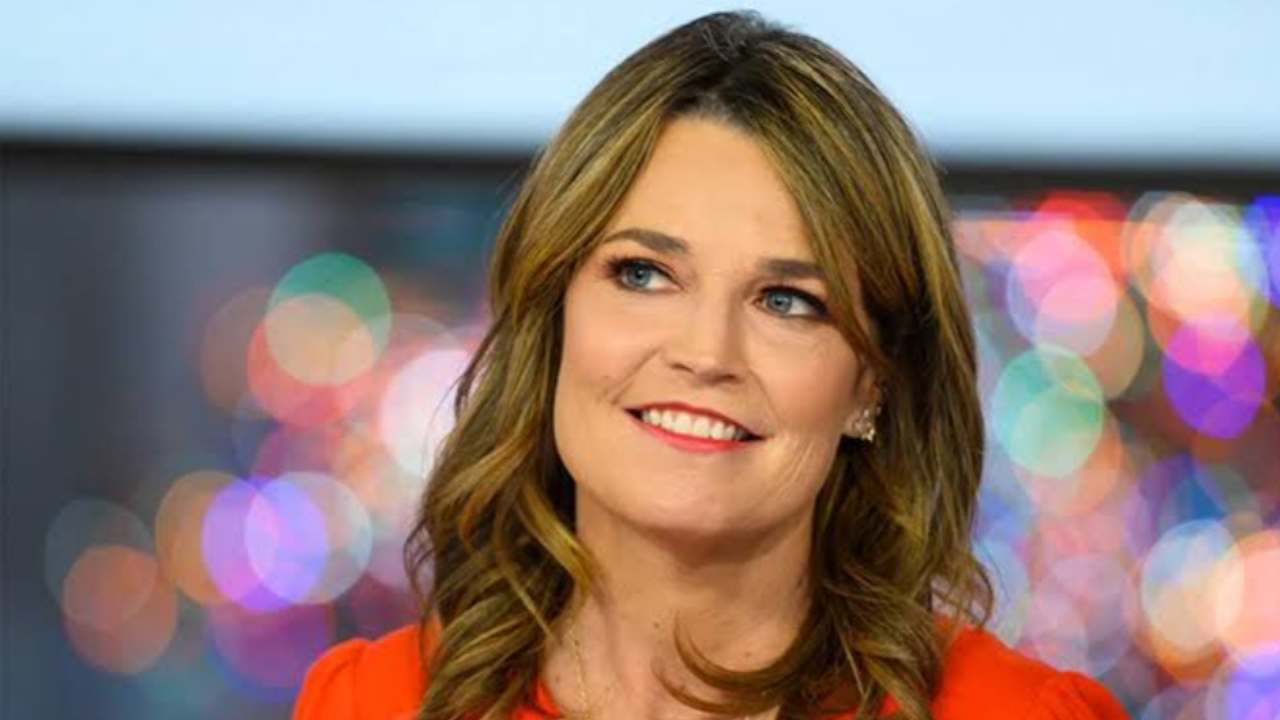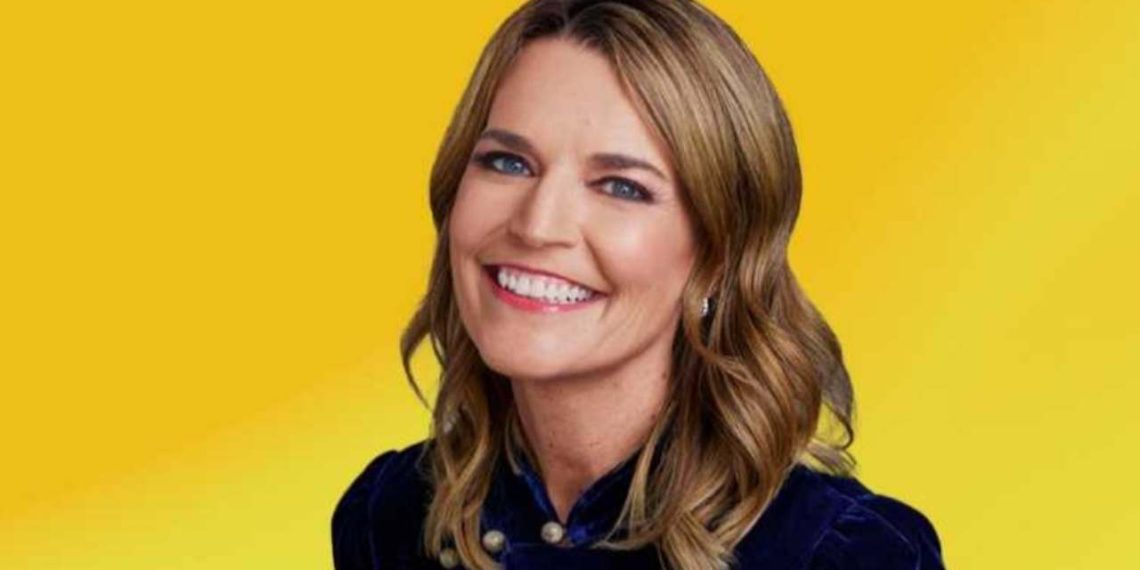Savannah Guthrie embarked on a journey beyond her comfort zone, aiming to embrace something both thrilling and scary: penning her latest book, “Mostly What God Does: Reflections on Seeking and Finding His Love Everywhere.”
For Guthrie, a devout Christian and TODAY co-anchor, the endeavor proved daunting. Despite her deep-rooted faith, she acknowledged feeling unease as a self-described “regular person,” lacking the scholarly credentials of a theologian or religious expert.
However, this very vulnerability infused the process with a sense of exhilaration, affirming the profound significance of her faith in shaping her identity. She tells,
“It’s what makes me tick. It’s what makes me joyful. It’s what helps me navigate the world and stresses and disappointments and fears.”
In the foreword of “Mostly What God Does,” a compilation of essays and introspective musings unveiled on February 20, Savannah Guthrie delineates a structured “road map” guiding the subsequent chapters.
Rooted in six fundamental facets of spiritual connection—such as love, hope, and purpose—she lays the groundwork for readers, regardless of their individual beliefs.

Moreover, Guthrie extends an inclusive invitation, emphasizing that the book transcends solely catering to devout believers, thereby fostering a broader dialogue on matters of faith and spirituality.
“You may be faith-full, you may be faith-curious, you may be faith-less, still scarred by a toxic religiosity of your past,” she writes. Regardless of which category applies to you, Savannah invites you to “come as you are.”
“I’m not writing this book from some mountaintop where I’ve received some wisdom, and now I’m imparting it to the world,” she explains in the TODAY.com interview. “No, I’m still down here, struggling. Still down here, disappointing myself. I’m still down here, needing faith, needing grace, needing mercy, needing love. That’s why I wrote the book — because I’m the person that needs to read it. And so I thought, if I do, then maybe others do, too.”
Before delving into what would eventually become “Mostly What God Does,” Savannah Guthrie, aged 52, had already co-authored two children’s books. Following the success of these projects, she found herself presented with various proposals for follow-up endeavors.
“From time to time over the years since I wrote those kids’ books, I might get an offer to write something: another children’s book or laughably even a cookbook once,” she shares.
“But I’ve always been so busy with the (TODAY) show and I’ve got little kids and I never really wanted to write anything,” the mom of two continues.

Roughly a year ago, an opportunity arose for Guthrie to explore the realms of faith through literature.
Intrigued, excited, and spurred on by the challenge, she embraced the idea wholeheartedly. Fuelled by her unwavering conviction that faith embodies her deepest passion, Guthrie resolved to embark on this transformative journey of self-expression.
“I wasn’t sure there would be a book at the end of it, but I knew that it would be a really important path and journey to take,” she adds.
Guthrie’s fascination with faith traces back to her upbringing as a Baptist in what she affectionately terms a “very churchy family.”
“We would go three times a week. It was very much part of my upbringing,” she recalls. “My sister has the best line in the book: She said, ‘God was the sixth member of our family,’ in our family of five.”
While “Mostly What God Does” isn’t a tell-all memoir, Savannah Guthrie acknowledges in the foreword that she candidly addresses personal and professional challenges within its pages. From the heart-wrenching loss of her father during her teenage years to navigating a divorce in her mid-30s, Guthrie’s narrative delves into the complexities of her journey.
Furthermore, she reflects on the ebbs and flows of her faith journey, oscillating between periods of devout study and enthusiasm, and moments of distance and disappointment where her connection with God waned.
All of what I have come to realize is that all of that is my faith story: belief and doubt, you know, joy, and also disappointment and sorrow. It’s all part of my faith journey,” she says.
“It’s all enhanced what I believe and have come to understand about God.”
The title of Savannah Guthrie’s book encapsulates the core message she aimed to convey: “Mostly What God Does is Love You,” derived from a translation by scholar and pastor Eugene Peterson of a poignant Bible verse.
From the outset of the writing process, Guthrie was resolute in emphasizing the theme of love, recognizing its profound significance as the cornerstone of her narrative.
“That sentence always hit me, and I loved it,” she explains.
“Because I think so many of us, particularly if you do come from any kind of faith background, you may be asking yourself, ‘What does God think of me? What is God doing right now? What does God think of that choice I made? Am I selfish? Am I flawed beyond reconciliation?’
“The answer is, ‘Mostly what God does is love you.’ What has he been doing this whole time? Just love you. And I love the simplicity and bareness of it. It’s simple, but it’s not easy.”
Savannah Guthrie ardently desires that the message of love transcends barriers of faith or doubt, resonating deeply with all readers. Regardless of one’s spiritual journey, she hopes her earnest portrayal of divine love within “Mostly What God Does” serves as a beacon of hope and solace, fostering connection and understanding amidst life’s myriad challenges. She says,
“I hope the book is appealing and compelling to anyone in any walk of life because it’s just a gentle call to be loved. And once you feel that love, well, you’ll find that you can’t help but share it. It’s just contagious. And I think that’s really the thrust of the book and really what I was trying to say,”
Indeed, Savannah Guthrie recognizes the profound significance of hope as a foundational aspect of spiritual connection. Amidst the deluge of distressing news headlines, she candidly acknowledges the inherent challenges in maintaining hope during difficult times.
However, Guthrie’s unwavering belief in the transformative power of hope permeates her narrative, serving as a guiding light amidst life’s darkest moments.
Her faith and her hope provide her with perspective in such situations:
“When I get discouraged, I try to go back to basics and remember that I’m not in charge. God is. And that I trust him and believe him and hope in him.”
However, she quickly adds that hope is a “word, it’s not a certainty.” She asks in her book, what if there is no silver lining? What if there is no justice in store for the world? What if, she writes,
“This whole idea of God is just a figment, a soothing story we tell ourselves?”
Amidst these valid ponderings, Savannah Guthrie consciously elects to lead a life imbued with optimism. Despite the uncertainties and challenges that may arise, she embraces a mindset rooted in positivity and resilience, finding solace in the belief that optimism can illuminate even the darkest of paths.
“None of us on Earth here can know if God is real or how it ends, right? We’re humans; we don’t get to know. No one knows what happens after death. No one comes back to tell. Fact. I would rather be hopeful and turn out to be wrong at the end than hopeless and turn out to be right,” she says. “Hope is the posture that I choose every single day.
Similar to her sister’s perspective of God as the sixth member of their family during their upbringing, Savannah Guthrie endeavors to integrate God into her own family dynamic with her husband Mike Feldman, who identifies as Jewish, and their two children, daughter Vale (9) and son Charley (7).
This commitment extends to establishing nightly prayers as a cherished family ritual, fostering a sense of spiritual connection and unity within their household.
“What I know is that it’s my job to give them the building blocks to teach them about the God that I know and help foster that connection,” Savannah says. “And then I also know that when they grow up, it will be their choice. And it’s just my job to give them as much information but also experience with God as I possibly can.”
Savannah recalls the joy and excitement her daughter Vale experienced during her recent baptism at their family’s church.
Reflecting on the poignant moment, Savannah was deeply moved by a heartfelt comment Vale made, underscoring the profound significance of the occasion and the spiritual connection shared within their family. She said,
‘‘Today, God, I joined your family.’ And that gives me a lot of joy.”
Despite Charley’s reservations, Savannah chuckles as she recounts his reaction to a less-than-flattering anecdote involving him from the book. Reflecting on the incident where Charley accidentally injured her eye with a toy train, Savannah acknowledges her son’s discomfort with its inclusion in her narrative.
Nonetheless, Savannah hopes that her children, including Charley, will eventually come to appreciate the book’s message as they grow older.
With the book dedicated to them and serving as a testament to her love and guidance, Savannah views it as a timeless gift, encapsulating everything she wishes to impart to her children about the profound love of God.




